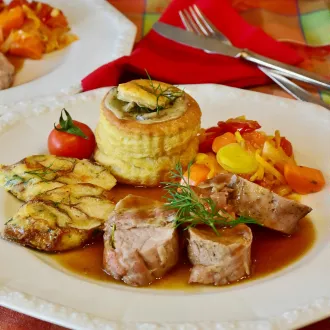ByOnlinecourses55

Protein rich foods maintain muscle mass - nutrition geriatrics
Protein is an essential macronutrient for muscle development and maintenance. It is not only essential for those who practice strength sports or bodybuilding, but also for anyone who wants to maintain a healthy and strong body. In this post, we will explore some of the best protein-rich foods that will help you achieve your muscle mass goals.
When we talk about protein, it's important to understand that not all protein sources are equal. Some are of high biological value, meaning they contain all the essential amino acids the body needs to function properly. Here is a list of protein-rich foods, both animal and vegetable, that will help you optimize your protein intake and, therefore, improve your muscle performance.
Lean meats, such as chicken, turkey and beef, are excellent sources of protein. For example, a 100-gram serving of chicken breast contains approximately 30 grams of protein, making it one of the most popular choices for those looking to gain muscle mass. These meats are also rich in B vitamins and iron, essential nutrients for overall health.
Salmon and tuna are two fish rich in protein, and they also contain omega-3 fatty acids, known for their benefits in muscle recovery. Salmon, for example, provides 20 grams of protein per 100 gram serving, making it a delicious and nutritious option to supplement your diet.
Eggs are one of the most accessible and high-quality sources of protein. One large egg contains approximately 6 grams of protein, and its yolk is packed with essential nutrients such as vitamins A, D, E and K. In addition, eggs are easily digestible, making them ideal for post-workout recovery.
Cottage cheese and Greek yogurt are perfect choices for those looking to increase their protein intake without adding too many extra calories. Cottage cheese contains up to 11 grams of protein per 100 grams, while Greek yogurt provides about 10 grams. Both are rich in calcium, an essential mineral for bone health.
It's not all about animal foods. Legumes such as lentils and chickpeas, as well as products such as tofu and tempeh, offer large amounts of plant protein. For example, lentils provide about 9 grams of protein per 100 grams, and tofu can contain as much as 8 grams. In addition, these foods are rich in fiber and other health-promoting nutrients.
Nuts such as almonds and walnuts, along with chia and sunflower seeds, are excellent sources of protein and healthy fats. Almonds, for example, contain up to 21 grams of protein per 100 grams, making them a perfect snack for those looking to maintain muscle mass.
Quinoa is a complete pseudocereal that contains all the essential amino acids. It is an ideal source of vegetable protein for vegans and vegetarians, with about 14 grams of protein per 100 grams. In addition, quinoa is rich in fiber and minerals such as magnesium, which help improve physical performance.
Incorporating these protein-rich foods into your daily diet is just the first step. To maximize the benefits, be sure to combine protein with a proper resistance exercise routine and weight lifting, as this stimulates muscle protein synthesis and promotes muscle growth. In addition, it is important to spread your protein intake throughout the day to optimize absorption.
Remember that the key to maintaining healthy muscle mass is a combination of balanced nutrition, regular exercise and adequate rest. So make sure you consume enough protein, hydrate properly and get the sleep you need to achieve the best results in your workouts.